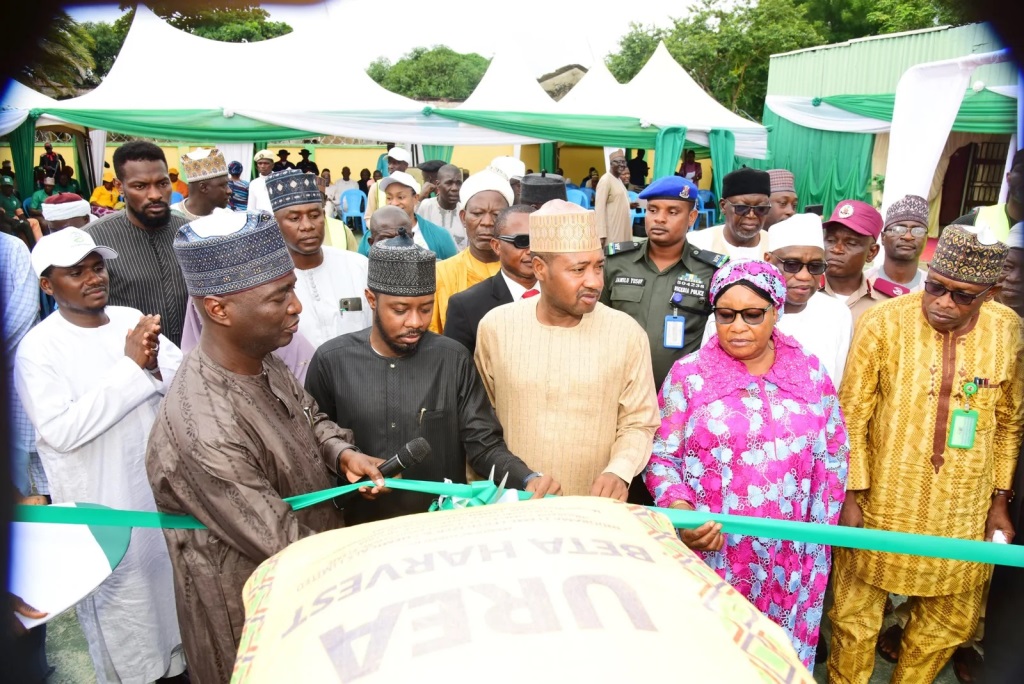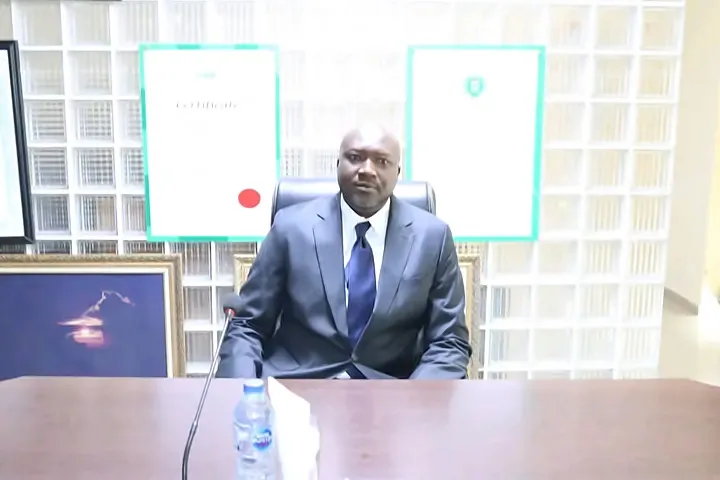General
FG Eyes 50,000 Jobs from FCT Agro-Processing Zones Project

By Adedapo Adesanya
The federal government is targeting the creation of 50,000 jobs in the Special Agro-Industrial Processing Zones (SAPZ) project direct and indirect jobs in the Federal Capital Territory, Abuja.
The FCT Minister of State, Mrs Mariya Mahmoud, stated this in Gwagwalada on Wednesday at the commencement of the distribution of agricultural inputs to the FCT SAPZ project’s beneficiaries to boost agricultural production.
Represented by the Mandate Secretary, Agriculture and Rural Development Secretariat for FCT Administration, Mr Lawan Geidam, she stated that women would constitute 40 per cent of the beneficiaries.
The Minister said the 50,000 direct and indirect jobs would be created within the five-year duration of the SAPZ project.
Mrs Mahmoud identified food as the most essential need for human survival, adding that agriculture plays a vital role in meeting this need, and said agriculture remained the mainstay of the nation’s economy, providing livelihoods to millions of people and ensuring food security.
The Minister, however, said that farmers and agro-entrepreneurs face numerous and complex challenges, ranging from climate change, poor agricultural practices, and access to markets.
She stressed, “These challenges require innovative solutions and collaborative efforts to address them.
“It is for these reasons that the FCT Administration has fully embraced the SAPZ Project, designed in line with President Bola Tinubu’s Renewed Hope Agenda.
“The project is designed to inject the much-needed manpower, resources and investments to reinvigorate the agricultural sector for sustainable development.”
Mahmoud expressed optimism that the agricultural inputs would be a vital catalyst for building a more resilient and sustainable agricultural sector in the FCT.
She identified the inputs as bull calves, animal feeds, improved seeds, fertilisers, crop protection chemicals and equipment.
The minister said that 5,000 crops and livestock farmers have been profiled and cleared to benefit from the support in the first phase of the SAPZ intervention.
Mahmoud reaffirmed FCTA’s unwavering commitment to supporting the successful implementation of the SAPZ project.
Speaking as the mandate secretary of the agriculture and rural development secretariat, Mr Geidam explained that SAPZ was initiated to unlock the potential of the livestock sub-sector in the FCT.
This, he said, was being done by providing critical financing and support to drive the growth, productivity, and sustainability of the sector.
He said that the project would also train various groups and provide funding for the operations of the groups in their respective agricultural ventures.
According to him, the support is expected to reduce the high cost of production to enable them to maximise the farmer’s earnings and improve their livelihood.
On her part, SAPZ Project Coordinator in FCT, Mrs Umma Abubakar, said that the project was a flagship initiative designed to revolutionise agriculture in Nigeria.
Mrs Abubakar added that the project was also expected to promote the livestock value chain and concentrate on industrial processing and marketing of beef and dairy products.
“It also aimed at developing the rural areas, increasing household income, and fostering job creation in rural agricultural communities, targeting youths and women.
“This in the long run will enhance food and nutrition security in FCT,” she said.
General
NIMASA Rallies Stakeholders’ to Develop National Action Plan

By Adedapo Adesanya
The Nigerian Maritime Administration and Safety Agency (NIMASA) has pledged its commitment to provide the regulatory leadership, technical coordination, and stakeholder engagement required to successfully develop and implement a robust National Action Plan on maritime decarbonization in Nigeria.
The Director General of the agency, Mr Dayo Mobereola, made this known during the National Stakeholders’ workshop on the development of a National Maritime Decarbonization Action Plan, further describing the workshop as a critical step in actualising the Federal Government’s blue economy and climate objectives.
Represented by the Executive Director, Operations, Mr Fatai Taiye Adeyemi, the NIMASA DG underscored the significance of the IMO GreenVoyage2050 Project, a technical cooperation initiative /designed to support developing countries in implementing the IMO GHG Strategy.
According to him, the National Action Plan being developed will reflect national realities, leverage existing capacities, address identified gaps, and align with broader economic and environmental priorities of the federal government.
Mr Mobereola stressed that “this transition is not merely about compliance with international obligations, it is about safeguarding our marine environment, protecting public health, strengthening the blue economy, and ensuring that our maritime industry remains competitive and future-ready”, the DG said.
Also speaking at the event was the Technical Manager of the IMO GreenVoyage2050 Project, Ms Astrid Dispert, who highlighted that the overarching objective of the initiative is to advance a coherent and globally aligned regulatory framework to accelerate maritime decarbonization.
She also emphasised that NIMASA plays a pivotal role in driving the project at the national level.
The IMO GreenVoyage2050 Project provides technical expertise and institutional support to assist countries in developing and implementing National Action Plans that promote sustainable shipping practices, encourage investment in clean technologies, and strengthen capacity for long-term emissions reduction.
Through this collaboration, the federal government is advancing deliberate steps towards maritime decarbonization, reinforcing its commitment to global climate goals and ensuring a cleaner, greener, and more sustainable future for the sector.
General
BPP Mandates Digital Submission for MDAs From March 1

By Adedapo Adesanya
The Bureau of Public Procurement (BPP) has directed all Ministries, Departments and Agencies (MDAs) to comply with its digital submission process effective March 1.
The directive was contained in a circular signed by the Director-General of the Bureau, Mr Adebowale Adedokun, noting that the move was part of the bureau’s commitment to digital transformation and paperless governance.
It explained that the transition followed an earlier circular of Aug. 4, 2025, which introduced electronic submission procedures.
According to the bureau, it has successfully moved from physical filings to a dedicated e-mail service for document submissions and is now advancing to a more robust and integrated system.
The circular announced the inauguration of the BPP Digital Submission Portal, a web-based platform designed to enable MDAs submit procurement-related documents directly to the Bureau.
It stated that the automated platform would streamline the submission process, enhance transparency and ensure accelerated tracking of procurement-related documents and petitions.
“With effect from March 1, all MDAs will be required to use the portal to submit requests for ‘No Objection’ Certificates, approvals for ‘No Objection’ for special procurements, clarifications and status updates on submissions,” the bureau said.
It added that the portal would be hosted on the Bureau’s official website and would become fully operational from the effective date.
The bureau warned that physical submissions or manual hand-deliveries would no longer be prioritised and would eventually be rejected following the full transition to the digital platform.
It urged accounting officers to brief their procurement departments and ICT units on the development to ensure seamless processing of procurement activities from March 1.
It further advised MDAs to contact the Bureau via its official email for information on the onboarding process and integration into the portal.
The bureau emphasised that full compliance by all MDAs was required to ensure a smooth transition and avoid delays in the implementation of the 2026 fiscal year procurement processes.
General
Senate Seeks Removal of CAC Boss Hussaini Magaji

By Adedapo Adesanya
The Senate has asked President Bola Tinubu to remove the Registrar General of the Corporate Affairs Commission (CAC), Mr Hussaini Ishaq Magaji, from office.
The Senate Committee on Finance, while passing a resolution in Abuja on Thursday, accused Mr Magaji, a Senior Advocate of Nigeria (SAN), of failing to honour the Senate’s invitations to account for the finances of his agency.
“He refused on so many occasions to honour our invitation to appear before this committee.
“We have issues with the reconciliation of the revenue of CAC.
“Each time we invite him, he gives us excuses,” the Chairman of the committee, Mr Sani Musa, said as the committee passed the resolution.
CAC was part of a group of agencies that the House of Representatives Public Accounts Committee (PAC) recommended zero allocation for the year 2026, for allegedly failing to account for public funds appropriated to them.
The committee, at an investigative hearing held two weeks ago, accused CAC and some other ministries, departments and agencies (MDAs) of shunning invitations to respond to audit queries contained in the Auditor-General for the Federation’s annual reports for 2020, 2021 and 2022.
The PAC chairman, Mr Bamidele Salam, stated that the National Assembly should not continue to appropriate public funds to institutions that disregard accountability mechanisms, saying this will create fiscal discipline and strengthen transparency across federal institutions and conform with extant financial regulations and the oversight powers of the parliament.
“Public funds are held in trust for the Nigerian people. Any agency that fails to account for previous allocations, refuses to submit audited accounts, or ignores legislative summons cannot, in good conscience, expect fresh budgetary provisions. Accountability is not optional; it is a constitutional obligation,” he said.
-

 Feature/OPED6 years ago
Feature/OPED6 years agoDavos was Different this year
-
Travel/Tourism10 years ago
Lagos Seals Western Lodge Hotel In Ikorodu
-

 Showbiz3 years ago
Showbiz3 years agoEstranged Lover Releases Videos of Empress Njamah Bathing
-

 Banking8 years ago
Banking8 years agoSort Codes of GTBank Branches in Nigeria
-

 Economy3 years ago
Economy3 years agoSubsidy Removal: CNG at N130 Per Litre Cheaper Than Petrol—IPMAN
-

 Banking3 years ago
Banking3 years agoSort Codes of UBA Branches in Nigeria
-

 Banking3 years ago
Banking3 years agoFirst Bank Announces Planned Downtime
-

 Sports3 years ago
Sports3 years agoHighest Paid Nigerian Footballer – How Much Do Nigerian Footballers Earn












